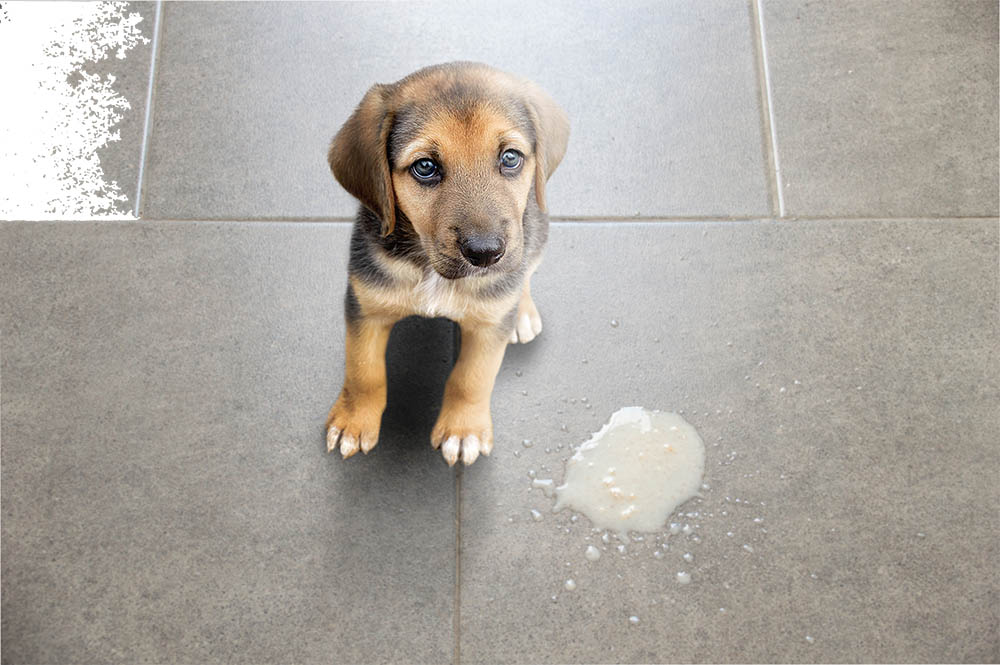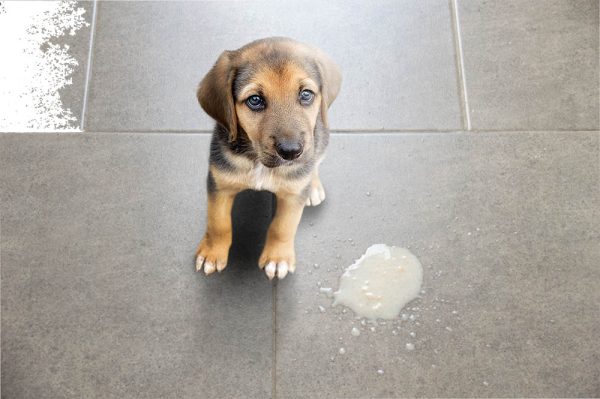Click to Skip Ahead
Yuck! You turn around at the sound and discover your dog has thrown up white foam on your carpet. Forget about the mess; what could have caused your dog to throw up? Let’s take a look at some of the potential reasons why your dog is throwing up white foam.
The 7 Possible Reasons Your Dog Is Throwing Up White Foam
The first thing you need to figure out is if your dog vomited the foamy material or coughed it up, as these should be treated differently. A white, frothy substance usually forms when your dog’s stomach contents and air mix with saliva.
1. Bilious Vomiting Syndrome
Is your dog routinely vomiting up material when they haven’t eaten for a while? Bilious vomiting syndrome could be the reason. While many dogs will vomit small amounts of yellow bile, some produce white and often foamy vomitus.
This condition typically occurs when a dog has not been fed for an extended period. It usually occurs early in the mornings when your pup has not eaten since the evening before.
If your veterinarian suspects bilious vomiting, they will likely recommend that you feed your dog a small meal right before bed. Ensure that you account for this additional meal in your dog’s daily calorie intake.

2. Indigestion
While we’ve often thought dogs can eat almost anything, that’s not the case. Many dogs have very sensitive digestive tracts, so eating something abnormal (even if it’s edible for you) can lead to an upset stomach. Sometimes, it even results in pancreatitis or inflammation of the pancreas, a potentially life-threatening condition.
If your dog is vomiting, your veterinarian will want to take a careful history. Think closely. Is there anything your dog might have eaten?
3. Eating Grass
Some dogs will eat grass and vomit up a frothy substance. We don’t always know why dogs eat grass.
- Dogs like the taste of grass.
- The food your dog eats is not complete.
- Your dog is stressed or anxious.
4. Parvovirus
Canine parvovirus is a devastating illness. The virus tends to affect rapidly dividing cells, especially gastrointestinal tract cells. Affected dogs may have vomiting or diarrhea and are often quite lethargic.
5. Intestinal Parasites

Intestinal parasites like roundworms can contribute to vomiting and diarrhea. While they are relatively common in younger dogs, parasites can affect any pup. Some are even zoonotic and contagious to people.
- Hookworms
- Whipworms
- Giardia
- Coccidia
- Tapeworms
6. Bloat or Gastric Dilatation Volvulus
Some dog breeds, such as Great Danes and German Shepherds, are more susceptible to bloating than others. With GDV, the stomach turns on its axis, cutting off the blood supply and preventing food from passing through to the intestines. Vomiting is possible.
- Lethargy
- Distended abdomen
- Respiratory distress
- Painful abdomen
7. Kidney or Liver Failure
Organ failure, especially of the liver or kidneys, can cause toxin buildup in your dog’s body. One sign is vomiting.
If your dog starts vomiting, your veterinarian will usually recommend blood work. The vet will check for liver and kidney enzyme elevations to evaluate for changes from normal.

When to Worry About a Dog Throwing Up White Foam
If your dog is throwing up white foam, take stock of its behavior and see if anything else is abnormal. If your dog is weak or lethargic, contact your veterinarian immediately.
PangoVet. It’s an online service where you can <b>talk to a vet online</b> and get the personalized advice you need for your pet — all at an affordable price!
</p>
<div class="su-button-center"><a href=https://www.dogster.com/ask-the-vet/"https://pangovet.com/?utm_source=dogster&utm_medium=article&utm_campaign=dog_vomiting%22 class="su-button su-button-style-default" style="color:#FFFFFF;background-color:#FF6600;border-color:#cc5200;border-radius:9px;-moz-border-radius:9px;-webkit-border-radius:9px" target="_blank" rel="nofollow"><span style="color:#FFFFFF;padding:0px 24px;font-size:18px;line-height:36px;border-color:#ff944d;border-radius:9px;-moz-border-radius:9px;-webkit-border-radius:9px;text-shadow:none;-moz-text-shadow:none;-webkit-text-shadow:none"> Click to Speak With a Vet</span></a></div></div></div>"}" data-sheets-userformat="{"2":513,"3":{"1":0},"12":0}"> If you need to speak with a vet but can’t get to one, head over to PangoVet. It’s an online service where you can talk to a vet online and get the personalized advice you need for your pet — all at an affordable price!

If your dog is acting normally and only vomits a small amount of white foam, consider the time of day and spacing between meals. Has it been a while since your furry family member ate? Is there any chance they are something abnormal, like a toy, mushrooms, or bacon? This information will be vital to your vet examining your dog.
If your dog vomits repeatedly, you should seek veterinary care. A pup with diarrhea is concerning and should be examined immediately.
- Excessive panting
- Delayed capillary refill time
- Dry or tacky gums or mucus membranes
- Skin on the neck doesn’t bounce back quickly when tented
- Sunken eyes
Frequently Asked Questions
Should I worry if my dog ate grass?
If your dog ate a little grass, monitor them for vomiting. If the grass was treated with chemicals, contact your veterinarian or a pet poison line immediately to see if your dog needs medical treatment. Otherwise, you’re likely okay just keeping an eye on your dog. If vomiting occurs or your dog repeatedly eats grass, consult your veterinarian to look for underlying health conditions.

Why is my dog’s vomit yellow?
Yellow vomit often includes bile. Bile is a normal product created in the liver and stored in the gallbladder. It helps break down days as part of the digestive process. Some dogs will vomit up small amounts of bile if they are affected by bilious vomiting syndrome, but other causes can include food allergies, pancreatitis, and parasites.
Conclusion
If your dog starts vomiting—whether white or yellow—it’s essential to speak to your veterinarian. Dogs might throw up white foam for numerous reasons, and it should be addressed, especially if it occurs repeatedly. If your dog vomits and acts lethargic, painful, or weak, still veterinary care immediately.
See also:
- Why Is My Dog Throwing Up Bile? Vet-Reviewed Causes & Treatments
- Why Is My Dog Foaming at the Mouth: Common Reasons (Vet Answer)
Featured Image Credit: cunaplus, Shutterstock













